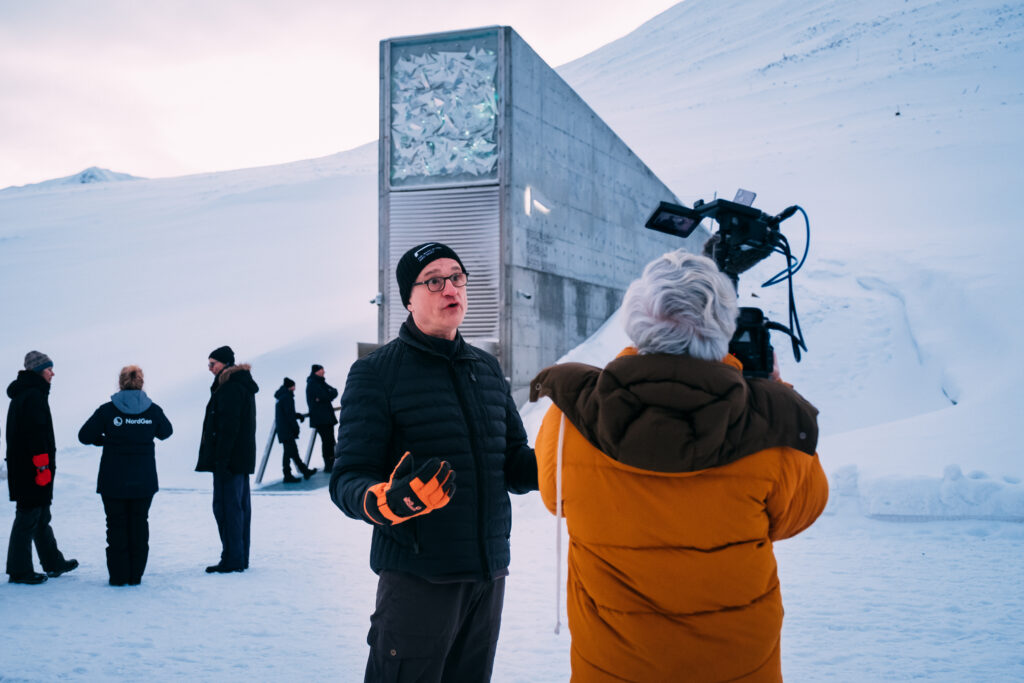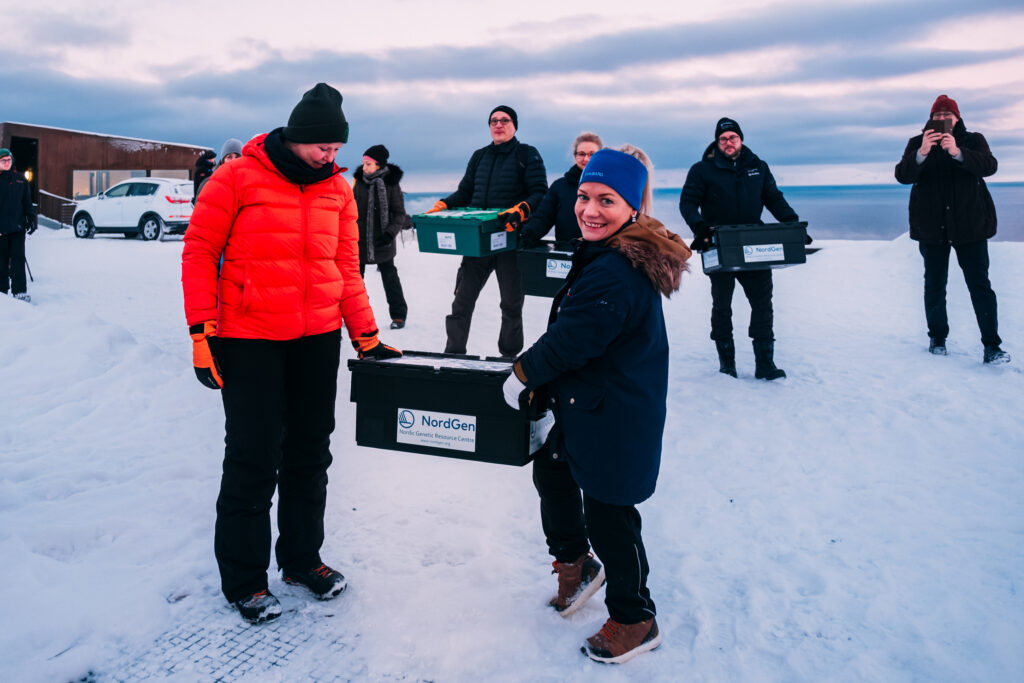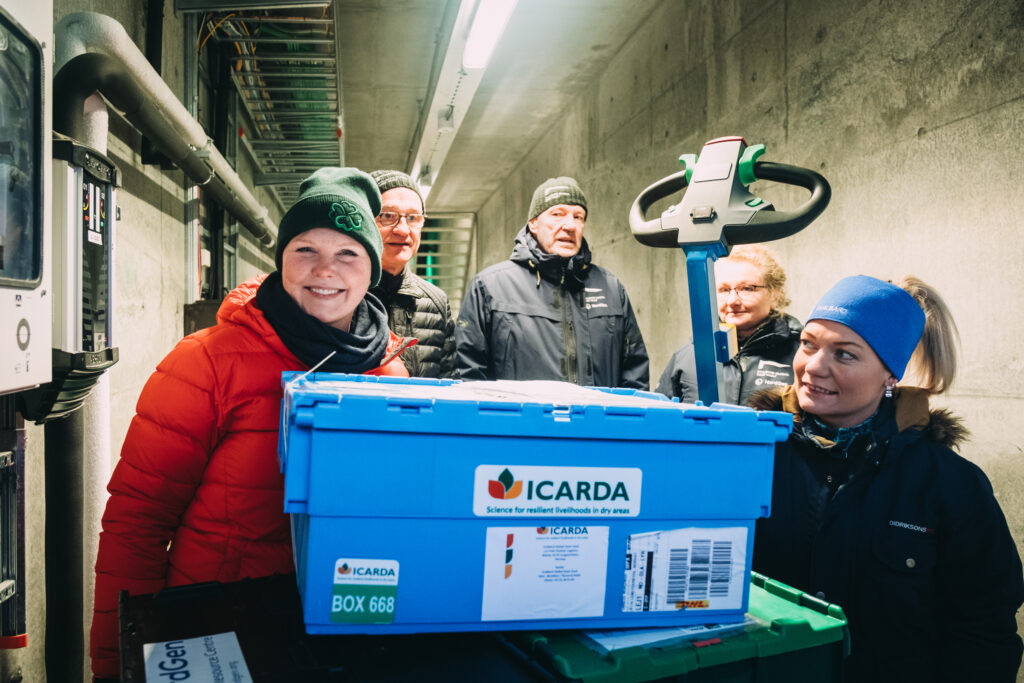
Minister of International Development Anne Beathe Tvinnereim and Minister of Agriculture and Food Sandra Borch. Photo: Dagmara Wojtanowicz38 boxes filled with 20,274 bags of seeds have been deposited by 9 genebanks under the first opening of the Seed Vault in 2022. After this deposit a total, of 1,145,693 seed samples of nearly 6,000 plant species are secured in the Seed Vault.
Australian Pastures
The Australian Pastures Genebank (APG) conserves, maintain and distribute seeds of pasture and forage species of value to Australian agriculture. “With 2600 species in the collection we are one of the most diverse in the world. We aim to have our entire collection duplicated for safety, so we work towards this aim” informs Dr. Alan Humphries, the curator at APG. “We now have 34,735 seed lines or almost half of the APG’s collection deposited in the Global Seed Vault.”

Vegetables and more from Germany
The Leibniz Institute of Plant Genetics and Crop Plant research (IPK) has by far the most diverse collection in the Seed Vault, when it comes to number of different species. Professor Andreas Börner, head of the Genebank at IPK explains that they send fresh seeds from crops that have been regenerated during the two passed years. He confirms that “About 64000 seed samples are now sent to Svalbard, for safety reasons. That accounts to about 44% of the whole IPK collection.”
Fruits from Slovakia
The Research Institute of Plant Production, Piestany in Slovakia deposited 452 seed samples. Many of which are seeds of fruits like apple, cherry and apricots that are distinct to specific districts of Slovakia. Rene Hauptvogel, researcher at the Slovak genebank explains why it is important to safeguard and make available crop diversity: The conservation of crop diversity is a key point in the overall protection of the environment. Without maintaining the diversity of life forms, it is not possible to maintain a healthy, safe, and sufficiently productive environment even for us humans.

ICARDA
This time, the largest deposit is being made by the International Center for Agricultural Research in the Dry Areas (ICARDA). ICARDA is still returning seeds regenerated from seeds retrieved from the Seed Vault between 2015 and 2019. (a total of 116,484 samples), to restore their collection that previously was located in Aleppo Syria.
Nordic Seeds The genebank of the Nordic countries, the Nordic Genetic Resource Center deposited 1350 seed samples which have been sealed inside three seed boxes. Amongst the seed samples is Svedjerug, an old Scandianavian variety of Rye (Secale cereale) specialized for slash and burn agriculture in coniferous forests. This type of rye was preserved, by the Nordic genebank perhaps at the last minute.
Another rare species is seeds of Phleum alpinum, a wild alpine relative of timothy grass, an important forage crop in Norway. Today Phleum alpinum is used for revegetation of areas after construction work in the mountains.
Also the Australian Pasture Genebank deposit seeds of wild forage crops. 236 seed samples are varieties of alfalfa which is a wild growing leguminous herb with deep roots. There is globally a growing interest for alfalfa as forage crop due to its drought tolerance and high protein content.
| Participating Genebanks | Country | Seed Samples (Accessions) | Boxes |
| The Australian Pastures Genebank / PIRSA-SARDI | Australia | 6,242 | 5 |
| Julius Kühn Institute (JKI) | Germany | 5 | 1 |
| Leibniz Institute of Plant Genetics and Crop Plant Research (IPK) | Germany | 4,715 | 8 |
| International Center for Agricultural Research in the Dry Areas (ICARDA) | Morocco | 6,336 | 15 |
| Margot Forde Germplasm Centre (MFGC) | New Zealand | 234 | 1 |
| The Nordic Genetic Resource Center (NordGen) | Nordic | 1,350 | 3 |
| Suceava Genebank ”Mihai Cristea” | Romania | 461 | 2 |
| Research Institute of Plant Production, Piestany | Slovakia | 452 | 3 |
| Agricultural Plant Genetic Resources Conservation and Research Centre (APGRC) | Sudan | 479 | 1 |
| Totals | 20,274 | 38 |
The Svalbard Global Seed Vault is established and owned by Norway and operated in a partnership between the Norwegian Ministry of Agriculture and Food, NordGen (the Nordic countries’ genebank) and the Crop Trust.
